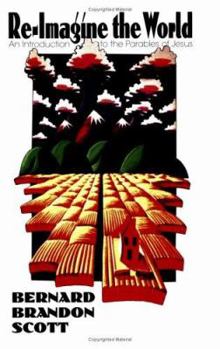Re-Imagine the World
Select Format
Select Condition 
Book Overview
In his parables Jesus re-imagines the world. The re-imagined world, called the kingdom of God, presents his followers with a new option for living, one that contrasts with the default world of the... This description may be from another edition of this product.
Format:Paperback
Language:English
ISBN:0944344860
ISBN13:9780944344866
Release Date:December 2001
Publisher:Polebridge Press
Length:180 Pages
Weight:0.54 lbs.
Dimensions:0.4" x 6.0" x 9.1"
Customer Reviews
3 ratings
The "Subversive Storyteller"
Published by Thriftbooks.com User , 16 years ago
Bernard Brandon Scott is a lay theologian and an internationally-known biblical scholar. He is a graduate of Vanderbilt University as well as St. Meinrad School of Theology in St. Meinrad, IN, where he taught. He is currently the Darbeth Distinguished Professor of New Testament at the Phillips Theological Seminary in Tulsa. He is a senior fellow with the Jesus Seminar. His book is a creative attempt, and for me a successful one, to take two possible approaches to parables and ask whether they "cohere" or "fit together" to represent a "consistent picture" of Jesus. Developing what he envisions as a model from surveying, he uses the work of the Jesus Seminar and chooses parables accordingly. He writes, "To lay out a map, a surveyor establishes points and then coordinates those points. I have developed three different coordinates. Each coordinate is specified by a parable that provides the initial insight that allows me to sketch the general contour of that coordinate. I will expand the insight by relating various other sayings and deeds to form a coherent field for each coordinate. With each coordinate we are, in a sense, plotting an aspect of Jesus' map. By triangulating the three points, the whole map of what Jesus is about should come into view." Maybe Jesus will look like a peasant Palestinian land surveyor! Let's see. Scott proceeds to take the parable of the leaven, the parable of the empty jar and the parable of the good Samaritan (which he prefers to call "From Jerusalem to Jericho") as his three coordinates. He contends that the world "implied in these three coordinates re-imagines a community's social experience." The Empire of God is at the core of this re-imagining that Jesus does. The re-imagining includes a redefinition of family, of God in a non-patriarchal world and of social relations. His summary claims that the Empire of God is the presiding symbol and it functions to create through the imagination a sphere in which those who are part of this community of envisioning can experience healing, the hospitality of the unclean and the presence of God in God's non-empirical activity. As a social community wherein peasants accept each other, reject the perspective that they are in agonistic conflict with each other and reach out to enemies, a real threat to Rome's rule is posed. What is envisioned, Scott argues, is the Empire of God or a counter-world to the Empire of Rome. This reviewer was captivated by the insights coming from Scott's book. He introduces Jesus as a "subversive poet," a new insight for me, and this makes him compelling. I have learned that this counter-world is a destination of grace and into the hands of the ultimate Mystery. Read this book and your faith journey just may be renewed! Mine was.
Excellent Source
Published by Thriftbooks.com User , 20 years ago
Re-Imagine the world is an excellent scholarly source on the parables and written in an easy to understand way. Scott keeps the chapters interesting, but not too long, and not confusing. It's a great book for people just beginning to read about the parables and for those who only want a brief overview. It shows many details that the common person would overlook, like Jewish law and ancient traditions. It is important for anyone to keep in mind that no one scholar is 100% right, but all scholarly points of view are important. It's an interesting, quick read. I definitely recommend it!
For the record
Published by Thriftbooks.com User , 20 years ago
I haven't bought this book yet, but I'm probably going to. I just wanted to clarify at least one erroneous statement from the previous review. The author states that the vine and the branches and the good shepherd are parables. While both elements are present in the gospel of John, but neither are parables. The Good Samaritan is a parable. It is a story told by Jesus to illustrate a point, usually about the nature of the kingdom of God. "I am the vine, you are the branches", while meaningful, is not a story to illustrate a point. It is an image. It may be a beautiful image, it may be an awful image. But an image it is. Both are instances of a trend of John's, a series of "I am" statements which are largely unique to John, and yes, do tend to exist in place of parables. For the author to assert that John isn't much fodder for the student of parables is actually correct. This is not to say that the gospel of John is of no interest or use, simply that it is of little use for those studying parables. In much the same way, the Declaration of Independence is not of much use to those who wish how to make a casserole. To say that the Declaration of Independence is of little use to those studying casserole is not a mark against the document, but merely to place it in its proper context. Thank you. That is all.





